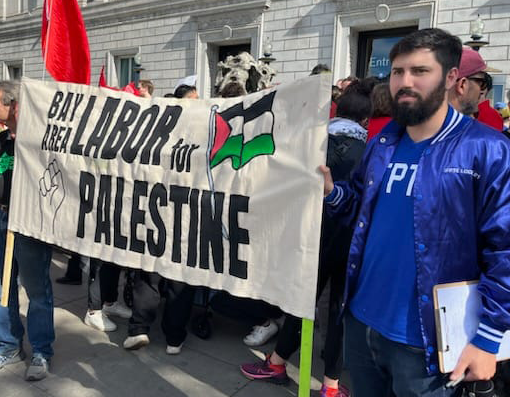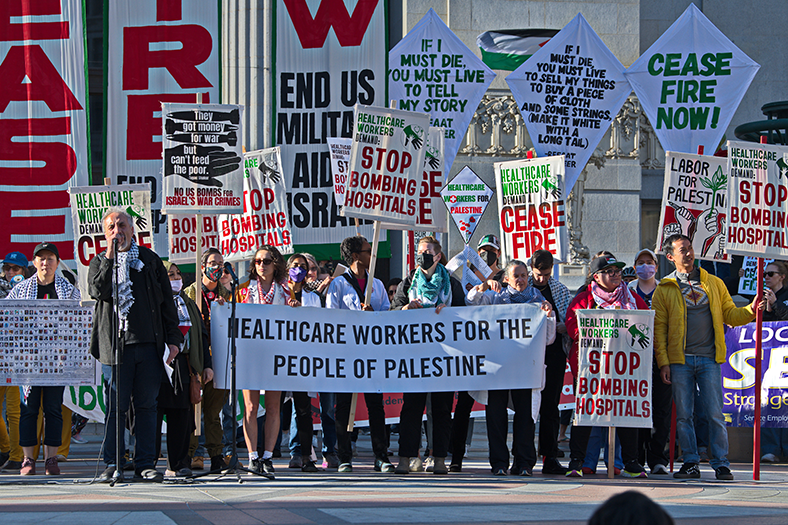News for the East Bay's diverse, working-class majority.
Brought to you by the Democratic Socialists of America, East Bay chapter.
December 17, 2023
East Bay DSA for Palestine
International Day of Solidarity: Free Palestine in front of San Francisco City Hall on November 5, 2023 (Photo: Keith BB)
by Sarah H
A day after the Israeli Defense Forces began its latest assault on Gaza, a group of East Bay DSA members crossed the bridge into San Francisco, bound for the Israeli Consulate. Their crimson shirts blended into a sea of red, green, black and white, as they joined our coalition partners in a call for resistance and the right to return after decades of struggle.
Since the war in Gaza broke out on October 7, an upsurge in solidarity with Palestine has reverberated around the world and across the East Bay. Chapter leaders and paper members alike have stepped up to bottom-line actions, from the chapter’s first mobilization on October 8 at the Israeli consulate, to the “No Money for Massacres” phone bank, to Oakland Educational Association’s resolution on Palestine and beyond.
Just as any mass organization becomes conditioned through struggle, EBDSA’s response to the war in Gaza has been a learning process. Not without its growing pains, our membership is figuring out how to mobilize people in the face of an American-backed genocide.
By joining the Palestinian resistance, the chapter took a step in becoming a mass organization that supports movement work and centers the anti-imperialist, internationalist line more directly.
In an effort to document this process, East Bay Majority spoke with six organizers who have bottom-lined large actions, phone banks and labor-backed resolutions.
In lieu of compiling a comprehensive list of all of the actions the chapter has taken to support Palestinian liberation, this article focuses on these three organizing tactics, which may continue to inform our local strategy and build our mobilizing capacity.
Actions
Public actions have become a central, and of course, highly visible, part of this movement. According to EBDSA member Thomas M, a crucial first step in the chapter’s mobilization was to democratically decide to support the Palestinian Action Network—a coalition that includes the Arab Resource and Organizing Center (AROC), the Palestinian Youth Movement (PYM), the Party for Socialism and Liberation (PSL) and Jewish Voice for Peace, among others.
“It was an important and healthy act of self-criticism as a chapter to ask ourselves, ‘How much are we centering ourselves versus providing support to make it happen?” Thomas said.
Though there was significant discussion about how a coalition should be built, and how much unity is required to take action with other organizations, ultimately, the chapter democratically decided that international solidarity should take precedence. EBDSA member Bert K. put it this way:
“In general, we should be willing to have programmatic unity with groups who may disagree with us on certain things,” Bert said. “It’s more important to get people out in this moment when genocide is happening in front of our eyes.”
As such, EBDSA members have taken on support roles at protests, like acting security marshals, to back the Palestinian Action Network.
“These are organic formations of people who have capacity who are willing to throw down,” Thomas said.
Bert also noted that the chapter steering committee has expedited its process of endorsing actions so that organizers can ensure better turnout at each protest.

The chapter’s capacity to mobilize has grown with each action, even sending a small detachment to the famous AROC-organized action to block a boat transporting Israeli military equipment out of the port of Oakland on November 4. The next day, DSA members from all Bay Area chapters came out in droves to the International Day of Solidarity: Free Palestine, joining a crowd of around 50,000 people that converged on San Francisco City Hall.
“I’ve really been impressed with the comrades that have come forward,” Bert said. “Some people who have been on the fringe of the work are now stepping forward as leaders, and it’s a great thing to see.”
Thomas M also pointed to smaller actions, such as the November 9 letter delivery and die-in at Representative Eric Swalwell’s District 14 office (following one at DeSaulnier’s District 10 office, led by organizers from outside DSA) in Castro Valley, when members demanded a conversation with the Democratic congressman. He told East Bay Majority that he believes DSA’s status as a mass organization shouldn’t preclude us from supporting liberatory movements.
“It’s imperative to embrace community organizing on top of mass organizing,” Thomas said.
“Letting myself be tutored by other organizers from other movement spaces and adopting their toolkits is, I think, a powerful way to reaffirm our commitment to becoming an organization of organizers, by learning from other orgs and creating those relationships.”
Phone banks
By the second week in October, the National Political Committee (NPC) voted to launch a national series of phone banks called “No Money for Massacres” to target members of Congress, urge them to vote no on sending military aid to Israel and call for an immediate ceasefire.
EBDSA and California DSA steering committee member Nickan F. helped kick off the first California phone banks on October 16, a coordinated effort between different DSA bodies that has continued weekly since then.
Nickan said that the East Bay phone banks have generated 25,000 calls and patched 450 people into their representatives, resulting in a few elected officials flipping their position to support a ceasefire, including Barbara Lee and Mark DeSaulnier. Nickan feels it’s a vital leadership development tool, as “a lot of people, myself included, had never taken on this specific task before, or never bottom-lined an event before.”
The phone banks also introduced a political education segment where guest speakers explain and summarize the conflict to help educate volunteers.
“I think we can build on this experience and do what we’ve done right again in the future,” Nickan added.
Labor for Palestine
Finally, organized labor has assumed a critical role in EBDSA’s response to Israel’s attacks on Gaza. By October 14th, members of East Bay DSA’s labor committee, themselves union members, had drafted a template resolution for union members to adapt and try to pass through their own unions. That effort quickly grew into Bay Area Labor for Palestine, as rank-and-file union members met weekly to figure out how to advance solidarity with Palestine in their unions.
According to EBDSA member Keith BB, many activists within the organization who found jobs as rank and file teachers and public workers have led the charge within their unions to create public statements about the genocide.
Part of that leg work is simply about figuring out how to talk to your coworkers about Palestine, said Keith.
“The important question to ask is, ‘why are we spending billions of public funds to pay for bombs blowing up schools instead of building them and paying for workers’ wages and addressing understaffing and crumbling facilities?”
These one-on-one organizing conversations are most effective when framed around America’s role in creating consent and the infrastructure required for apartheid, he added.
“We don’t have to be experts to know that huge civilian casualties are not okay and that the US government shipping out billions is causing massive civilian casualties,” he said.
Sometimes, these conversations even lead to widespread rank-and-file support for resolutions in support of Palestine, according to EBDSA member and Oakland educator Hillary C.
Namely, the Oakland Education Association—a union containing many DSA members—was one of the first labor organizations to unite its membership around collective support of the Palestinian resistance.
Almost immediately after October 7, EBDSA member and teacher Maura M. began talking to another rank-and-file member of OEA who wanted to write a resolution. This ad hoc group called itself OEA for Palestine.
“We took the DSA template and started workshopping from there, inserting our perspective as educators,” Maura recalled. “We involved several people from my [school site] and it was really collaborative.”
OEA’s response was fast. In about three days’ time, Maura and her fellow educators had submitted the draft resolution to the union’s executive board. Ultimately, the resolution was passed unanimously on October 18 and went on to pass through OEA’s Representative Council on November 6. These resolutions not only help push an anti-imperialist line forward, it also helps flex the muscle of democracy within the union and normalize the fundamental socialist priority that we fight for people we don’t know.
Hillary C explained that OEA for Palestine has also begun to organize teach-ins as a way to engage their students in dialogue about the Palestinian resistance.
In October, students at Hillary’s school, Oakland Tech, led a walkout of 50 or so high schoolers that she said materialized mostly through word-of-mouth.
Hillary added that OEA for Palestine has shared these teaching materials with other educational unions, like UESF, to build capacity for cross-rank-and-file organizing.
Maura M’s school, which is located in the Oakland flatlands, has a significant population of immigrant families from the Americas. The students learn about colonization during the indigenous peoples’ unit in their social studies classes. So it wasn’t a leap for a group of those same students, recognizing the Palestinian struggle as also similarly indigenous and decolonial, to organize a walk-out and turn their parents out for the November 4 protest.
“These students very much understand displacement and US imperialism,” she said.

East Bay DSA members started Bay Area Labor for Palestine as an organizing space for supporting these rank-and-file efforts to push local unions to stand in solidarity with Palestine and call for a ceasefire. The group now includes members of nearly twenty Bay Area unions, and community and political organizations. The organizing efforts of Bay Area Labor for Palestine coalesced at the Bay Area Labor for Palestine rally at Oakland’s Oscar Grant Plaza on December 16, with contingents from unions like OEA, UESF, UAW 2865, ILWU Local 10 and more, as well as the Palestinian and Arab-led organizations PYM and AROC. This labor-led march was the first of its kind in the country.
Looking ahead
As the Palestinian resistance continues to grow, there will be more opportunities for EBDSA to build mobilizing capacity and bolster our international solidarity work. Another one of the highlights coming out of this moment of political rupture is a reinforcing of our cross-chapter relationships with those others in the Bay area, namely DSA San Francisco, Marin DSA, and Silicon Valley DSA, as mutually-supportive contingents formed for these mass rallies.
“Having that communication across chapters, allowed us to be supportive in each other’s local organizing as well, if even just being able to plug other folks into work that was closer to where they could express their power,” Thomas said.
“For example, Marin DSA has been wanting to pressure their local House Rep. Huffman into calling for a ceasefire, meanwhile someone in JVP who I’ve been working with did as well, and I was able to connect them to bolster their efforts or at least get conversations going.”
Bert noted that humanitarian crises have an unfortunate way of fading into the background as time goes on and atrocities become normalized.
“The challenge is, how do we become part of a sustainable movement in support of Palestine and connect to anti-imperialist struggles?”
Both Thomas M and Bert K emphasized that the rechartering of the chapter’s International Solidarity Anti-Imperialist subcommittee as its own proper committee is a further step in the right direction.
“It’s never not a crisis for the Palestinian people,” Bert said. “At this moment, we need a broad united front to oppose Israeli apartheid and support the Palestinian resistance. It has to be central to our work.”